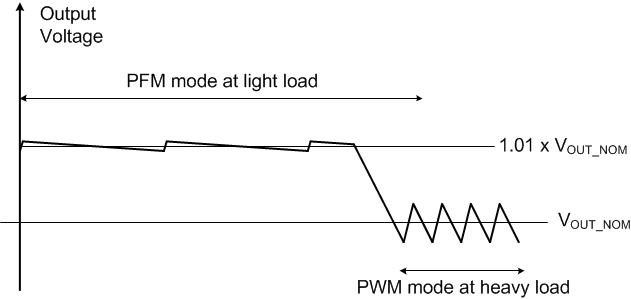SLVSD38C November 2015 – August 2021 TPS61089
PRODMIX
- 1 Features
- 2 Applications
- 3 Description
- 4 Revision History
- 5 Device Comparison Table
- 6 Pin Configuration and Functions
- 7 Specifications
- 8 Detailed Description
- 9 Application and Implementation
- 10Power Supply Recommendations
- 11Layout
- 12Device and Documentation Support
- 13Mechanical, Packaging, and Orderable Information
Package Options
Mechanical Data (Package|Pins)
- RNR|11
Thermal pad, mechanical data (Package|Pins)
Orderable Information
8.4.1.2 PFM Mode
The TPS61089 improves the efficiency at light load with PFM mode. When the converter operates in light load condition, the output of the internal error amplifier decreases to make the inductor peak current down, delivering less power to the load. When the output current further reduces, the current through the inductor will decrease to zero during the off-time. Once the current through the high-side N-MOSFET is zero, the high-side MOSFET is turned off until the beginning of the next switching cycle. When the output of the error amplifier continuously goes down and reaches a threshold with respect to the peak current of ILIM / 10, the output of the error amplifier is clamped at this value and does not decrease any more. If the load current is smaller than what the TPS61089 delivers, the output voltage increases above the nominal setting output voltage. The TPS61089 extends its off time of the switching period to deliver less energy to the output and regulate the output voltage to 1.0% higher than the nominal setting voltage. With the PFM operation mode, the TPS61089 keeps the efficiency above 70% even when the load current decreases to 1 mA. At light load, the output voltage ripple is much smaller due to low peak inductor current. Refer to Figure 8-1.
 Figure 8-1 Output Voltage in PWM Mode and PFM
Mode
Figure 8-1 Output Voltage in PWM Mode and PFM
Mode